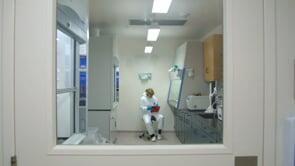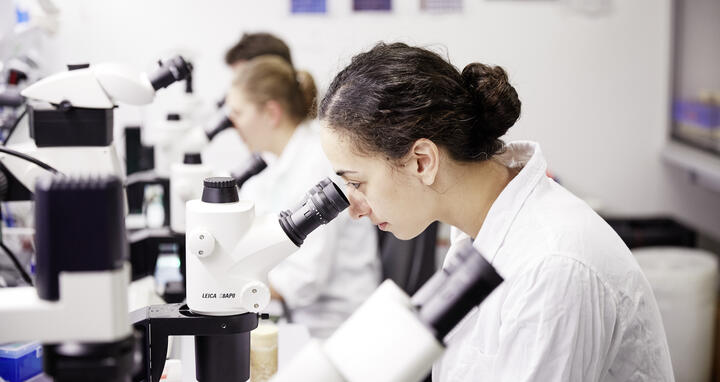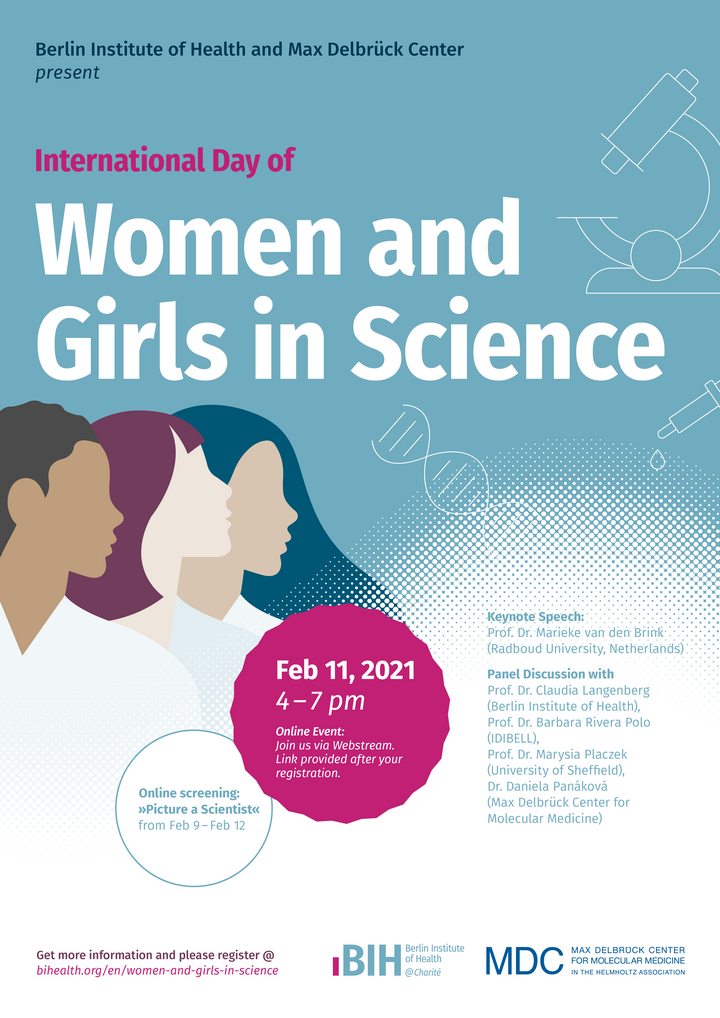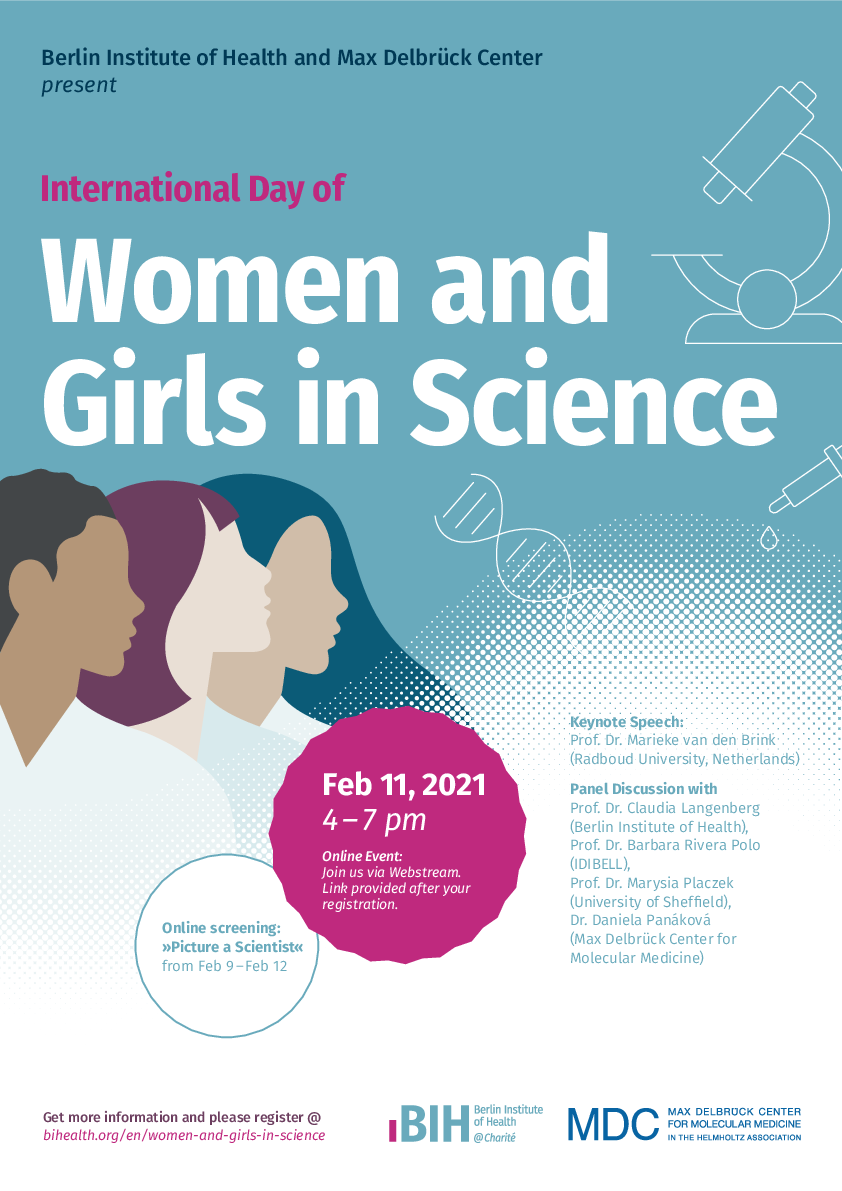Internationaler Tag der Frauen und Mädchen in der Wissenschaft
Internationaler Tag der Frauen und Mädchen in der Wissenschaft
BIH und MDC laden Sie ein, den Internationalen Tag der Frauen und Mädchen in der Wissenschaft (11. Februar) mit einer Filmvorführung von "Picture a Scientist" und einer anschließenden Keynote und Podiumsdiskussion zu feiern. Wir freuen uns darauf, mit unseren Gästen und Ihnen zu diskutieren, welche Veränderungen notwendig sind, um die Kultur und Struktur in der Wissenschaft vielfältiger, gerechter und offener für alle zu gestalten.
In der aktuellen Pandemiesituation sehen wir mehr denn je die Schlüsselrolle der Wissenschaft bei der Bereitstellung von Lösungen für die Herausforderungen, denen wir als Gesellschaft gegenüberstehen. Und es ist klar, dass wissenschaftliche Entdeckungen vielfältige Perspektiven brauchen, um innovative Ergebnisse auf höchstem Niveau zu erzielen. Die angemessene Berücksichtigung von Frauen oder Mitgliedern unterrepräsentierter Gruppen in der Wissenschaft auf allen Ebenen erweitert die Perspektiven und Meinungen und trägt so zu herausragender Forschung bei.
Bislang sind Frauen in der Wissenschaft, insbesondere in Führungspositionen, noch unterrepräsentiert. Frauen stellen im Durchschnitt die Hälfte der Doktoranden, aber nur jeder vierte Professor in Deutschland ist eine Frau. Vorurteile und Geschlechterstereotypen, aber auch strukturelle Barrieren im Wissenschaftssystem erschweren es Frauen, in der Wissenschaft erfolgreich zu sein. Frauen haben häufiger als Männer befristete Verträge, arbeiten in Teilzeit und werden für dieselbe Arbeit schlechter bezahlt. Die Zitierraten für Männer sind höher, Einstellungsverfahren bevorzugen Männer gegenüber Frauen und wir können beobachten.
Den Link zur Veranstaltung erhalten Sie nach Ihrer Registrierung.
Die Veranstaltung findet in englischer Sprache statt.
Venue
Virtual Meeting
Zeit
Program
Programm
Filmvorführung online "Picture a Scientist": 9. Februar, 18:00 Uhr - 12. Februar, 18:00 Uhr
Am 11. Februar 2021
16:00 Uhr - Eröffnung und Begrüßung
Prof. Dr. Baum, Wissenschaftlicher Direktor des BIH
Prof. Dr. Graßmann, Administrative Vorständin des MDC
16:15 Uhr – Keynote "Gender Inclusion in Higher Education"
Prof. Dr. Marieke van den Brink, Radboud University, Niederlande
17:15 Uhr - Podiumsdiskussion zur Gleichstellung in der Wissenschaft
Prof. Dr. Claudia Langenberg | Berlin Institute of Health
Dr. Daniela Panáková | Max Delbrück Center for Molecular Medicine
Prof. Dr. Marysia Placzek | University of Sheffield, UK
Prof. Dr. Barbara Rivera Polo | IDIBELL, Spain; McGill University, Canada
18:30 Uhr - interaktives Online-Networking
- Keynote Speech
-
-
Prof. Dr. M.C.L. Marieke van den Brink | Radboud University, Netherlands
Keynote "Gender Inclusion in Higher Education"
Universities are increasingly establishing diversity initiatives and implementing programs with the goal of creating an inclusive environment. But what is an inclusive university and what does it take to become more inclusive? Is it possible to be inclusive for everyone? And which dilemmas might arise when dealing with diversity in universities? In this talk, Prof. Marieke van den Brink will discuss these questions and point to changing number, institutions and knowledge, which might be a starting point for envisioning an inclusive university.
About: Marieke van den Brink is Professor of Gender & Diversity at the Radboud University Nijmegen, the Netherlands. Her main research interest focuses on ways gender inequalities are produced and countered in organizations, especially academia. She was local principal investigator of the EU FP7 Garcia Project 'Gendering the Academy and Research: Combating Career Instability and Asymmetries' (garciaproject.eu). This study focuses on the implementation of interventions in European Universities and research centers to counter the gendered effects of austerity, new managerialism and globalization. It shows how the economic recession is creating a turbulent environment for higher education systems which poses new gender equality challenges for universities and early career academics. Her work has been published in the Journal of Management Studies, Organization Studies, Organization, Human Relations, Gender, Work & Organization, and Social Science & Medicine. Marieke is member of the Editorial Board of the British Journal of Management and Associate Editor of Gender Work and Organization. She has been elected as member of the Young Academy of the Royal Netherlands Academy for Arts and Sciences (KNAW).
https://www.ru.nl/english/people/brink-m-van-den/
- Panel Discussion
-
-
Prof. Dr. Claudia Langenberg | Berlin Institute of Health
Claudia Langenberg is Professor of Computational Medicine at the Berlin Institute of Health (BIH), Charité–Universitätsmedizin, and programme leader at the Medical Research Council (MRC) Epidemiology Unit at the University of Cambridge. Her research focuses on genetic mechanisms underlying metabolic diseases such as type 2 diabetes and uses data-driven approaches to better understand metabolic regulation in the population.
“Gender equality in science is important because science is life.”
Dr. Daniela Panáková | Max Delbrück Center for Molecular Medicine
Daniela Panakova finished her PhD with Suzanne Eaton at Max Planck Institute of Molecular Cell Biology and Genetics in Dresden, Germany in 2005. After a short postdoctoral stay in her lab,she moved to Boston, MA and worked with Calum MacRae at Harvard Medical School/Brigham and Women's Hospital until 2011. She established her independent research group at Max Delbrück Center for Molecular Medicine in July, 2011 after obtaining Helmholtz Young Investigator Program Grant. She is interested in investigating the interactions between physiology and signaling pathways throughout development and in applying the obtained knowledge to understand the mechanisms underlying common disease states.
Prof. Dr. Marysia Placzek | University of Sheffield, UK
Marysia Placzek is Professor of Developmental Neurobiology at the University of Sheffield. Her research aims to elucidate the cellular and molecular programmes that underpin development of the hypothalamus. She performed post-doctoral studies with Professor Jane Dodd at Columbia University, NY, where she revealed the key role of the axial mesoderm in organizing the ventral CNS, and contributed to the characterization of two key signalling ligands, Shh and Netrin. As an independent investigator, first at the National Institute for Medical Research, then at the University of Sheffield, she began to reveal mechanisms through which signalling molecules orchestrate hypothalamic development, then exploited this knowledge to develop protocols for the directed differentiation of embryonic stem cells towards defined hypothalamic neuronal fates. Her research in the adult mouse provided one of the first indications that tanycytes in the postnatal hypothalamus are stem/progenitor cells. Throughout her tenure at TUoS, she has played an instrumental role in supporting the translation of developmental biology to an understanding of disease mechanisms. She was Acting Director, then Director, of the MRC Centre for Developmental and Biomedical Genetics, then established the Bateson Centre, focused on development and disease research. She stepped down from the directorship in 2015, in order to focus on her current research into defining hypothalamic stem and progenitor populations. She has four children, now all grown!
“Gender equality in science is important because balance is so important to every aspect of life”
https://www.sheffield.ac.uk/biosciences/people/bms-staff/academic/marysia-placzek
Prof. Dr. Barbara Rivera Polo | IDIBELL, Spain; McGill University, Canada
Bárbara Rivera PhD is a Junior Leader investigator at the Hereditary Cancer Group of the Instituto de Investigación Biomédica de Bellvitge - IDIBELL (Barcelona) and an adjunct professor at the Gerald Bronfman Department of Oncology, McGill University (Montreal). After completing her PhD in 2013, in the study of familial polyposis syndromes (Human Genetics Programme, CNIO, Spain), Bárbara move to McGill to carry out her postdoctoral studies on the genetic predisposition to rare cancers. In February 2018, Bárbara became an assistant professor at the Oncology Department of McGill University to focus her research in the genetics and molecular mechanisms of rare tumors. Early 2020 Bárbara joined the IDIBELL research community to continue her research program in rare tumor syndromes. In particular, she has a great interest in syndromes characterized by the development of low-grade and benign tumors.
“Gender equality and diversity are essential motors for the development of any society. As scientists, we value and promote how multidisciplinary our projects and teams are from a skills point of view. However at the organizational level the number of women that reach a leader position is still quite lower than men so we are missing half of the “candidates” to take part in those teams, highlighting the failure of the system in achieving the desired “multi” descriptor.”
- Film "Picture a Scientist"
-
-
PICTURE A SCIENTIST is a feature-length documentary film by Sharon Shattuck & Ian Cheney chronicling the groundswell of researchers who are writing a new chapter for women scientists. A biologist, a chemist and a geologist lead viewers on a journey deep into their own experiences in the sciences, overcoming brutal harassment, institutional discrimination, and years of subtle slights to revolutionize the culture of science. From cramped laboratories to spectacular field stations, we also encounter scientific luminaries who provide new perspectives on how to make science itself more diverse, equitable, and open to all.
Trailer

Please note that once registered, participant will have the opportunity to watch the film 48 h prior to the event, Feb 9th - Feb 12th 6 pm CET. You will get a link to the digital screening room before the screening starts. We recommend to watch the film before the panel discussion but the screening room will be open even after the event and you still have the opportunity to watch it later.
Dokumente
Organisator*innen
Christiane Nolte (MDC) and Karin Höhne (BIH )



